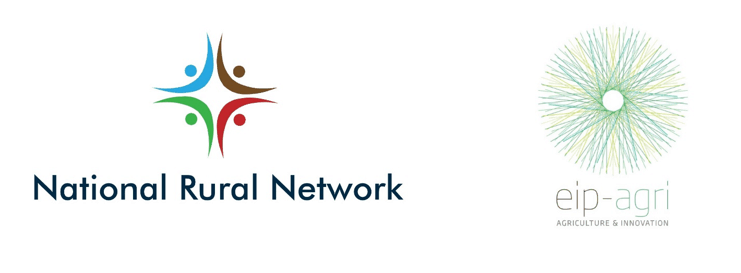In this National Rural Network EIP-AGRI guest blog, Peadar Casey, Innovation and Enterprise Development Manager at Institute of Technology Carlow (IT Carlow), provides us with an informative insight into his participation at a number of initiatives run by the EIP-AGRI Service Point since 2015 exploring the role of information technology within farming and rural economic development, with a particular focus on the development of a smart and sustainable digital future for agriculture and rural areas throughout Europe.
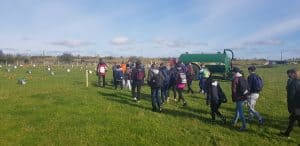 Digital technologies in agriculture and rural areas not only help European farmers to ‘produce more with less’, thus contributing to their livelihoods, they also address the wider sustainability challenges lying ahead for the agri-food sector, as well helping to combat climate change. I have been involved with numerous initiatives run by the EIP-AGRI Survive Point since 2015 exploring the role of information technology within farming and rural economic development, with a particular focus on the development of a smart and sustainable digital future for agriculture and rural areas. The structure and content of these EIP-AGRI seminars, workshops and conferences have been stimulating and insightful, providing participants with a range of opinions and observations from within the EU and beyond. The picture that has emerged over the past five years is that technology has three core purposes within agriculture:
Digital technologies in agriculture and rural areas not only help European farmers to ‘produce more with less’, thus contributing to their livelihoods, they also address the wider sustainability challenges lying ahead for the agri-food sector, as well helping to combat climate change. I have been involved with numerous initiatives run by the EIP-AGRI Survive Point since 2015 exploring the role of information technology within farming and rural economic development, with a particular focus on the development of a smart and sustainable digital future for agriculture and rural areas. The structure and content of these EIP-AGRI seminars, workshops and conferences have been stimulating and insightful, providing participants with a range of opinions and observations from within the EU and beyond. The picture that has emerged over the past five years is that technology has three core purposes within agriculture:
- The safety aspects focus on the physical and mental wellbeing of farmers, rural citizens and visitors to the rural environment.
- The efficiency factors are across economic, environmental and social capital.
- There is a growing trend in using technology to connect farmers and their environment, with curious consumers, who want to understand where their food comes from and how they can play a part as a conscientious consumer.
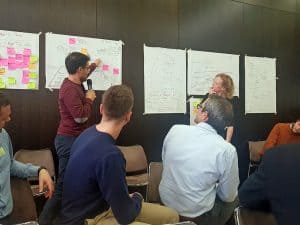 The appropriate use of digital technology will assist farming and associated activities to make sensible decisions to sustain agriculture and rural social, environmental and economic ecosystems. I use a three-step model in evaluating and managing the innovation process. The model filters opportunities through phases of (a) what is possible to (b) what is probable and finally (c) what is profitable.
The appropriate use of digital technology will assist farming and associated activities to make sensible decisions to sustain agriculture and rural social, environmental and economic ecosystems. I use a three-step model in evaluating and managing the innovation process. The model filters opportunities through phases of (a) what is possible to (b) what is probable and finally (c) what is profitable.
While using this process with agriculture and rural focused initiative there is a growing trend that the most suitable projects are driven by individuals from within the industry and an understanding of the rural economy. The product / service is usually built in a customisable format and serves a practical purpose which delivers clear value to the farmer / consumer and wider ecosystem. These facts are applicable to any industry but particularly applicable to farming and rural development, where margins are small and there is little room for speculative purchases.
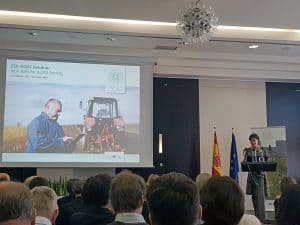 An EIP-AGRI Service Point seminar entitled ‘New Skills for Digital Farming’ was held in in Aranjuez, Spain from the 5th to 6th of February 2020. The seminar aimed to contribute to the design and implementation of approaches and tools that can help farmers and farm advisers develop the skills they need in the face of the digital transition in agriculture. There was healthy debate and demonstration of digitally enabled initiatives at this event, all of which was focused on how information technology can enhance the agriculture, rural economic and extended supply chain. The key ‘take away’ messages from the seminar were as follows: (a) rural economies are hot spots for innovative ideas, and ambition (b) skills development is important but sensible development of ideas is more important (c) collaboration is the key to bringing an idea from a spreadsheet to a saleable product or service and (d) rural based innovation extends beyond agriculture and rural activities, the idea of innovating from anywhere to anywhere is now possible. The seminar report has recently been published by the EIP-AGRI Service Point.
An EIP-AGRI Service Point seminar entitled ‘New Skills for Digital Farming’ was held in in Aranjuez, Spain from the 5th to 6th of February 2020. The seminar aimed to contribute to the design and implementation of approaches and tools that can help farmers and farm advisers develop the skills they need in the face of the digital transition in agriculture. There was healthy debate and demonstration of digitally enabled initiatives at this event, all of which was focused on how information technology can enhance the agriculture, rural economic and extended supply chain. The key ‘take away’ messages from the seminar were as follows: (a) rural economies are hot spots for innovative ideas, and ambition (b) skills development is important but sensible development of ideas is more important (c) collaboration is the key to bringing an idea from a spreadsheet to a saleable product or service and (d) rural based innovation extends beyond agriculture and rural activities, the idea of innovating from anywhere to anywhere is now possible. The seminar report has recently been published by the EIP-AGRI Service Point.
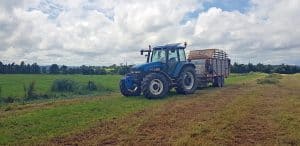 Since this seminar in Spain, there has been an unexpected increased focus on rural based economies as places to centre innovation and entrepreneurial activity upon coming from the Covid-19 crisis. The utilisation of space and social distancing is less of an issue in rural environments than it is in urban areas. Furthermore, many of the skills and interests needed to develop innovative ideas already exist within rural communities. As we manage through a time of uncertainty, the opportunity for rural economies to become places to base technology development initiatives, is an exciting new opportunity for rural communities throughout Europe. Digital skills, interests and infrastructure are now primed to combine natural assets, social capital and sensible investment to stimulate vibrant rural entrepreneurial ecosystems.
Since this seminar in Spain, there has been an unexpected increased focus on rural based economies as places to centre innovation and entrepreneurial activity upon coming from the Covid-19 crisis. The utilisation of space and social distancing is less of an issue in rural environments than it is in urban areas. Furthermore, many of the skills and interests needed to develop innovative ideas already exist within rural communities. As we manage through a time of uncertainty, the opportunity for rural economies to become places to base technology development initiatives, is an exciting new opportunity for rural communities throughout Europe. Digital skills, interests and infrastructure are now primed to combine natural assets, social capital and sensible investment to stimulate vibrant rural entrepreneurial ecosystems.
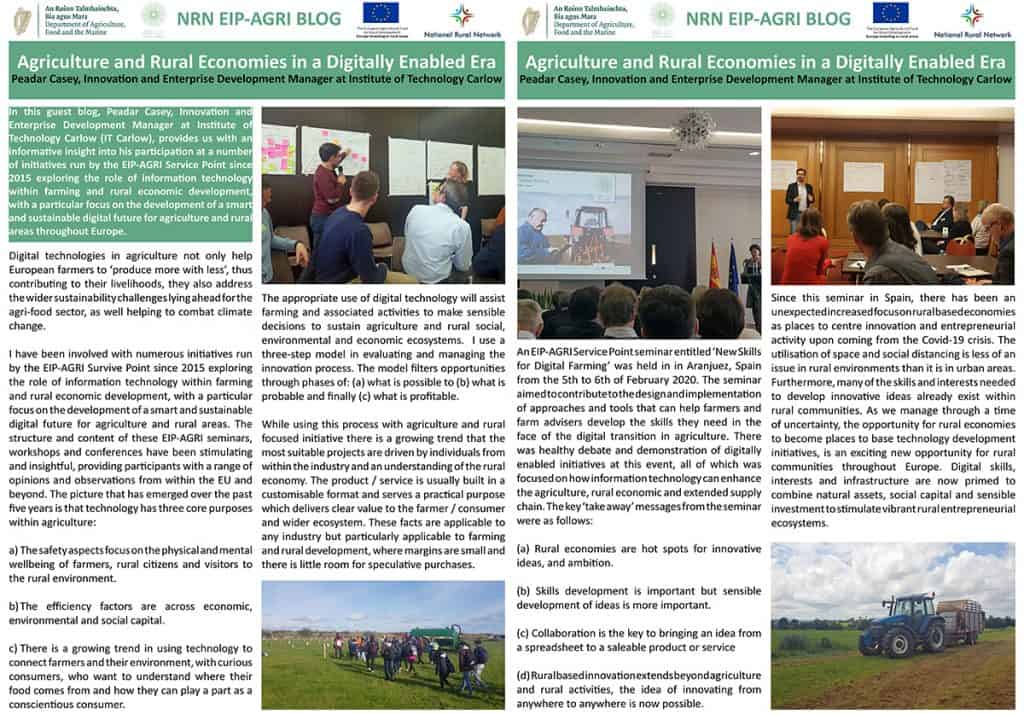
A printable version of this blog can be downloaded here.
Author Biography
 Peadar Casey is the Enterprise Development Manager at Institute of Technology Carlow, with particular interest in regional entrepreneurship ecosystem development. Peadar manages ERIC (Enterprise Research Incubation Centre) centre where there is a particular emphasis on the practical application of technology within both rural and urban environments, and associated industries. The development of a FUTURE studio within the incubation centre is the latest initiative designed to engage with international networks and open innovation initiatives. Peadar has over 25 years’ industry experience, with over 15 years working for a multinational food organisation, in Ireland, UK and across EU markets. His role within the corporate environment involved enterprise and business development across international markets within an entrepreneurial culture and environment. Peadar also worked as an independent consultant for over 10 years – providing services in engineering, ICT, agriculture, energy and food industries in conjunction with enterprise development agencies initiatives As an independent consultant, he is focused on developing existing and startup enterprises using business model and market development initiatives, both nationally and internationally.
Peadar Casey is the Enterprise Development Manager at Institute of Technology Carlow, with particular interest in regional entrepreneurship ecosystem development. Peadar manages ERIC (Enterprise Research Incubation Centre) centre where there is a particular emphasis on the practical application of technology within both rural and urban environments, and associated industries. The development of a FUTURE studio within the incubation centre is the latest initiative designed to engage with international networks and open innovation initiatives. Peadar has over 25 years’ industry experience, with over 15 years working for a multinational food organisation, in Ireland, UK and across EU markets. His role within the corporate environment involved enterprise and business development across international markets within an entrepreneurial culture and environment. Peadar also worked as an independent consultant for over 10 years – providing services in engineering, ICT, agriculture, energy and food industries in conjunction with enterprise development agencies initiatives As an independent consultant, he is focused on developing existing and startup enterprises using business model and market development initiatives, both nationally and internationally.
Twitter: @PeadarCasey
If you are interested in writing a guest blog post on the topic of EIP-AGRI, Farm Viability or LEADER to be featured on the National Rural Network website and various social media pages, please email Dr Shane Conway, Researcher at NUI Galway and with the NRN for more details: shane.conway@nuigalway.ie
The NRN are always looking to highlight and promote innovative initiatives that will help inspire people in the farming community and in rural areas to maximize the success of the objectives set out in the Rural Development Programme 2014-2020.
